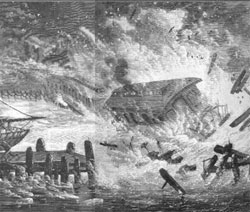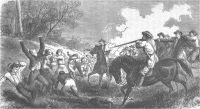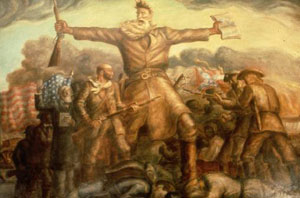From Housekeeping to Gilead, Marilynne Robinson has always been exploring what counts as genuine faith.
By Chris Lehmann
 |
When Marilynne Robinson published her debut novel, Housekeeping, in 1981, admiring critics had already allotted her a tidy spot in the tacit consensus of American letters. Housekeeping was a sharp, assured coming-of-age tale, arising out of a fictional Pacific Northwest settlement called Fingerbone, all but abandoned by the gaudier tumult of postwar America’s own coming-of-age. Its narrator, a teenage girl named Ruth, had likewise been exiled from conventional comforts of hearth and home. Her family story was an extended study in abandonment, madness and tragedy; the book opens with an arresting account of her family’s chronic, and faintly comic, state of half-bewildered loss, neatly distilled in the fabled, early 20th-century train accident that claimed the life of Ruth’s conductor-grandfather. The train lurched off a bridge and into the deep waters of Lake Fingerbone; its wreckage was never reclaimed, and its fate seemed a synecdoche for both the out-of-the-way town and the strange country picking off members of Ruth’s extended family one by one: “The disaster took place midway through a moonless night. The train, which was black and sleek and elegant, and was called the Fireball, had pulled more than halfway across the bridge when the engine nosed over the lake and then the rest of the train slid after it into the water like a weasel sliding off a rock. A porter and a waiter who were standing at a railing at the rear of the caboose…survived, but they were not really witnesses in any sense, for the equally sound reasons that the darkness was impenetrable to any eye and that they had been standing at the end of the train looking back.”
This was a sly, discomfiting inversion of other American odysseys of self-discovery along the frontier interior: Here was a landscape so barren that the fondest reveries of progress make literally no mark; it consigns a great Promethean Fireball to mute, mocking and (most absurdly of all) wet oblivion. Indeed, Fingerbone’s eponymous lake made a habit of such mockery, flooding with every spring snowmelt, and transforming most houses in town into waterlogged parodies of civilized habitation. Near the end of the novel, Ruth makes another dark sojourn on the lake’s surface in the company of her crazy aunt Sylvie — who has become the sole guardian of Ruth and her sister after a different stretch of the landscape claims the life of Ruth’s mother. Ruth reflects as they drift in a stolen rowboat alongside the same bridge where the train derailed that the lake might well capsize them at any moment, and imagines swelling with water to the point of rebirth: “say that the water and I bore the rowboat down to the bottom, and I, miraculously, monstrously, drank water into all my pores until the last black cranny of my brain was a trickle, a spillet…The only true birth would be a final one, which would free us from watery darkness and the thought of watery darkness, but could such a birth be imagined? What is thought, after all, what is dreaming but swim and flow, and the images they seem to animate?”
 |
Openly speculative fiction of this kind, with its strong undercurrent of religious longing, has never sat well with keepers of American literary tradition, at least not since the day of Hawthorne, Poe, and Harold Frederic. If bodies of water must be metaphors, they should be duly contained vessels of self-discovery, like Huck Finn’s Mississippi or Ahab’s North Atlantic. But Robinson was proposing here a singularly morbid reverse baptism, a second birth obliterating the watery darkness of the first. And yet, little was made of the distinctly religious preoccupations of Housekeeping — the novel’s frequent allusions to the transitory nature of life, its central themes of exile and wilderness, even the narrator’s biblical name, which is all but synonymous with sojourning among strangers.
Instead, since Robinson’s novel appeared near the high-water mark of second wave feminism, Robinson was read mainly as a high literary “women’s” author, working out the contradictions inherent in confining female life in a separate domestic sphere as an untamed frontier beckons just beyond the housekept walls. There is, after all, a strong current of such women writers working within the regionalist grain, all chronicling the course of solitary women on the road to independence — Sarah Orne Jewett, Ellen Gilchrist, Willa Cather, to name but a few. Better to pack Robinson off with that hardy band and assign Housekeeping to the MFA programs, where it did indeed earn a cult following, keeping the title steadily in print while many other accomplished first works of fiction drifted off to the remainder table.
This all bears mentioning in some detail because Marilynne Robinson refused to stay put for this neat literary taxonomy. As the many readers and critics who admired Housekeeping awaited a follow-up novel, Robinson began publishing polemic nonfiction works. The first, Mother Country (1989), was a searing critique of both the environmental impact of nuclear power and of the anti-nuclear activism of groups like Greenpeace, which sued Robinson in British libel court and got the book banned in England. In 1998, Robinson published a collection of essays, The Death of Adam, that was an all but official declaration of war on the modern world. Robinson excoriated the smug certainties of sociobiology and market fundamentalism while passionately pleading for unfashionably pious figures like John Calvin, Jonathan Edwards, and Dietrich Bonhoffer.
 |
| Marilynne Robinson |
The modern intellectual project — exemplified by thinkers like Freud, Darwin and Nietzsche — is meanwhile found guilty of abolishing our most vital forms of self-understanding, even the practice of making moral distinction itself: Under this new dispassionate scientism, Robinson wrote, “equivalent trauma is assumed to produce more or less equivalent manifestations in every case, so there is little use for the mind, the orderer and the reconciler, the artist of the interior world. Whatever it has made will only be pulled apart…Our hypertrophic brain, that prodigal indulgence, that house of many mansions, with its stores, and competences, and all its deep terrors, and very rich pleasures, which was so long believed to be the essence of our lives, and a claim on one another’s sympathy and courtesy and attention, is going the way of every part of collective life that was addressed to it — religion, art, dignity, graciousness. Philosophy, ethics, politics, properly so called.”
This seemed very far afield from the chill, retiring muse that seemed to inform so much of Housekeeping. It was a bit as though, say, Katherine Ann Porter had somehow morphed into the prophet Jeremiah.
It is indeed the book of Jeremiah that furnishes the title for Robinson’s long-awaited second novel, Gilead; specifically the prophet’s well known lamentation for “a balm in Gilead” to salve the wounds of the “daughter of Zion,” besieged by Jerusalem’s many sins, blasphemies, and injustices. Robinson, too, has a salvific vision of Gilead, but in this novel it is a small town in Iowa in 1956, where the book’s narrator, a 77-year-old Congregationalist preacher named Jonathan Ames, is compiling a gently instructional diary for his son, the six-year-old issue of Ames’s somewhat scandalous May-December marriage with a much younger parishioner. Ames’s heart is failing, and doctors expect he will die soon, so he’s assembling this free-associative record of his life as a spiritual testament, which he intends his son to read long after his death, when he comes into his own maturity.
 |
Gilead, then is one sort of defiantly old-fashioned endeavor — the pedagogic parents’ memoir — wrapped inside another, an epistolary novel. The voice of Ames, in addition, is a form of the American pastoral that, at the novel’s outset especially, is likely to grate on the ear of many a literary sophisticate, as when he describes a local character as someone who would “walk off with a jar of…pickled beets without so much as a by-your-leave” or marvels, apropos of very little, about life’s folksier quandaries: “I have been thinking about existence lately’ or “I was trying to remember what birds did before there were telephone wires.”
Yet Ames’s sometimes stilted speech gradually deepens, as does the homiletic course he initially charts for his journal, into unexpected registers of self-questioning and anguish. Preaching aside, the life of any father this old with a son this young, pitched so starkly at either end of the life cycle, would occasion a lot of rumination about last things, and the mere act of imagining his son’s aging into adulthood without him unsettles Ames, on both his own behalf and the boy’s: “Sometimes it has seemed to me that you were looking back through life,” he writes, “back through troubles I pray you’ll never have, asking me kindly to explain myself.”
That explanation inevitably leads Ames back to questions of faith, especially since Ames is the third in an eponymous series of Midwestern Congregationalist preachers, dating back to his larger-than-life grandfather, who helped found the town of Gilead as an abolitionist colony harboring runaway slaves and refugees from “Bleeding Kansas” in the 1850s. And Ames ruefully confesses that this patrimony seems to be reversing itself as well: “My father left me a trade, which happened to be my vocation. But the fact is, it was all second nature to me, I grew up with it. Most likely you will not.”
 |
| Bleeding Kansas |
Yet recognizing that the salience of his faith — and therefore of spiritual authority like his — is passing into another world, helps him apprehend its true contours anew. Ames gives his son a deceptively matter-of-fact account of his own theological birthright, which like most matters concerning patrimony (and faith, for that matter), is far more divided than it first appears. His father — the middle Jonathan Ames — broke with the family’s fire-breathing abolitionist patriarch when he saw up close the human costs of the Civil War — and how deeply his father embraced those sacrifices as part of the Lord’s own justice, the fulfillment of prophetic vision. (Part of that sacrifice was the older man’s own: He lost an eye on a Confederate battlefield.)
The rift between the first two Preacher Ameses never healed, even though the grandfather remained in Gilead throughout our narrator’s childhood — a restless shade of unappeasable Old Testament righteousness, driven to steal the family’s meager possessions and ready cash for distribution among the needy. When he saw his son deliver a characteristically serene sermon on the Beatitudes, he stormed out after five minutes to the town’s only black church, in order, as he put it, “to hear some preaching.” Sizing up his son in the argument that followed, the old man announced, “What kills my heart, Reverend, [is] that the Lord never came to you. That the seraphim never touched a coal to your lips–” At which point his son breaks in: “I remember when you walked to the pulpit in that shot-up bloody shirt with that pistol in your belt. And I had a thought as powerful and clear as any revelation. At it was, this has nothing to do with Jesus. Nothing. Nothing. And I was, and I am, as certain of that as anyone could ever be of any so-called vision.”
Much of what happens in Robinson’s remarkably candid, searching novel of religious ideas likewise builds into an argument about what counts as genuine vision, genuine prophecy,
 |
| Prophet Jeremiah |
genuine faith. Ames’s own instinct, reinforced by his 50 years of ministering to small town Iowan souls, is to smooth over faith’s rougher edges, but here he recalls a boyhood vision of his own, over the grandfather’s long-neglected grave in remotest rural Kansas, where the embittered old prophet had repaired to die. Ames joins his father in prayer over the headstone, which reads only REV AMES, and he notices the rising moon and falling sun, suspended in blazing mutual reflection: “Each was standing on [the horizon’s] edge, with the most wonderful light between them. It seemed as if you could touch it, as if there were palpable currents of light passing back and forth, or as if there were great taut skeins of light suspended between them…And that grave, and my father and I, were exactly between [the sun and moon], which seemed amazing to me at the time, since I hadn’t given much thought to the nature of the horizon.”
It’s fitting that the boy’s vision should resolve into the older man’s abstracted amazement over the mundane idea of the horizon: The third Jonathan Ames’s predicament is to translate the raw stuff of revelation into digestible, homey homily, the sort of insight calculated more to provoke a “you don’t say” or a “gee whiz” than to conjure a seraphim’s coal touched to the lips. As a younger man, he warred more openly with his own easeful penchant for spiritual reassurance. Once, after the great influenza outbreak of 1917, he was stirred to compose a sermon in his own father’s scourging pacifist voice, arguing that the virus was a divine chastisement of the cheerful bloodlust that greeted America’s entry into the Great War. “The Lord was gathering [young soldiers] in before they could go off and commit murder against their brothers,” the sermon read. But after writing it, Ames lost the nerve to deliver it. “I seemed ridiculous to myself to imagine I could thunder from the pulpit,” he recalls, “…and I dropped that sermon in the stove and preached on the parable of the lost Sheep.”
It is as if Ames’s boyhood vision of light — so oddly complementary to Ruth’s climactic vision of underwater rebirth in Housekeeping — has blinded him to any clear sense of prophetic mission. So he, like many other postwar exponents of liberal Protestantism, oscillates uneasily around the middle terms of belief. He protests, for example, the austere, ungenerous character of his grandfather’s moral judgments, on the wan, self-satisfied grounds that “these people who can see right through you never quite do you justice, because they never give you credit for the effort you’re making to be better than you actually are.”
 |
| “Tragic Prelude,” by John Steuart Curry John Brown during Bleeding Kansas decade |
Contrary to his grandfather’s “far too narrow…idea of what a vision might be,” this Jonathan Ames upholds the more comforting notion of “visions that come to us only in memory, in retrospect,” citing as examples the beatific visages of the children he’s baptized. Ames marks yet another sort of sacred time by listening to baseball games on the radio; if he lives long enough to see the 1956 election, he intends to vote for Eisenhower.
Yet even as he prepares, as it were, to tuck in his placid, post-visionary reveries for that long good night, Ames’s own sense of his spiritual legacy comes in for a very unwelcome test. His boyhood friend and Presbyterian colleague, Old Boughton, has a prodigal son who was Ames’s de facto godchild. Some 50 years previous, Ames had lost both his first wife and infant daughter in childbirth, and Boughton honored his widower friend by christening his new son Jonathan Ames Boughton. But this legacy, too, goes more than a little haywire. Ames’s namesake in the Boughton family grew up godless, careless, and vicious. When he left for college, he sired an illegitimate daughter out of a thoughtless Gilead dalliance, and disclaimed all responsibility. After that episode ends tragically, he vanishes almost completely form the orbit of the town, and his family.
But he abruptly resurfaces, significantly enough, at precisely the same moment that Jonathan Ames is parsing out the private meanings of revelation in his journal. Ames’s musings over the sacredness of infant baptizing redouble the irony, since it was he who presided over Jack Boughton’s christening — though the boy’s father concealed the honorific name choice until the moment when Ames was poised to pronounce it from the pulpit.
Jack Boughton is 43 when he returns to Gilead, ostensibly to care for his father, who like Ames is clearly not long for this world. It seems likelier to Ames, however, that the younger Boughton has returned expressly to vex and disarm him — not least because he instantly ingratiates himself to Ames’s wife, who is his contemporary and assumes an easy camaraderie with him. Ames’s son, too, immediately reveres the newcomer: “You look at him like he’s Charles Lindbergh,” Ames notes, with not a little worldly envy. When Boughton turns up unexpectedly at one of Ames’s sermons, seated next to his wife and son, the old preacher can barely stir himself out of the sinful condition that, following the Bible, he calls “covetise.”
Boughton does more than tempt Ames into unchristian sentiments; he picks maddening theological quarrels with the old preacher concerning the plausibility of faith, which run the predictable, exasperating course of most such discussions between confirmed skeptics and convicted believers. Yet Ames is prodded into a new sort of religious vision, stretching well beyond his customary, anodyne grasp of faith. He begins pondering what it might mean to consider Jack Boughton from the standpoint of grace, an impersonal vantage from which “I could forget all the tedious particulars and just feel the presence of his mortal and immortal being…He did then seem to be the angel of himself, brooding over the mysteries his mortal life describes, the deep things of man.”
 |
| “Baptism of Christ,” by Joachim Patenier |
In a sort of double movement of grace, once Ames ventures toward imagining such contact with Boughton, it is vouchsafed to him. In the process he comes to learn the reasons behind Boughton’s homecoming to Gilead and what has been grinding away at the younger man’s sense of well-being. Without giving away too much about the nature of Boughton’s wound, it bears noting that it is very much of a piece with the burning vision of racial rectitude that Jonathan Ames’s long-dead grandfather used to clamor over. It is no coincidence, after all, that Ames describes the corrosive worldly skepticism of Boughton using the same words he chose to characterize his grandfather’s prophetic moral certainty: “he always seems to see right through me.” Yet now, pondering the vapid sermon he delivers as Boughton hears him preach for the final time, Ames is not moved to protest his earnest intent to better himself, but rather to marvel at the insufficiency of his speech.
Ames likewise sees the stolid, insular world of Gilead in a harsh new light: “This town might as well be standing on the absolute floor of hell for all the truth there is in it…There must have been a hundred little towns like it” during abolitionism’s high tide, he continues, “set up in the heat of an old urgency that is all forgotten now, and their littleness and their shabbiness, which was the measure of the courage and the passion that went into the making of them, now just look awkward and provincial and ridiculous, even to the people who have lived here long enough to know better.”
This, needless to say, is hardly the quiescent moral instruction to his young son that the old man set out to record. But the estimable achievement of Robinson’s novel is to render Ames’s late-life spiritual crisis entirely within the worldview of a believing soul. American fiction has of late adopted a string of believing protagonists who do more than exemplify rank hypocrisy and mouth hollow pieties in the hallowed tradition of Elmer Gantry. The main cast of religious fiction, in popular terms at least, is the crass and baleful biblical realism of the Left Behind series. Beyond that, however, is a more fastidious reluctance to treat religious themes, and religious characters, with a studied, aloof exoticism. All too often, believers in American literature are either entirely creatures of invitingly alien spiritual traditions (as in the fiction of Louise Erdrich or Russell Banks), two-dimensional glyphs, onto which writers project their own conception of what constitutes spiritual anguish (as in the secular-tinged catechisms of a Mark Salzman or an Anne Lamott), fodder for satirical sport (e.g., Martin Clark’s Plain Heathen Mischief and Ben Marcus’s Notable American Women, to name but two recent, absurdly overpraised examples) or a barely literate lumpen peasantry in clumsily-executed and didactic works of dystopian fiction, in the dubious tradition of Margaret Atwood’s The Handmaid’s Tale.
 |
Gilead is far from a perfect novel — some of Ames’s theological musings sometimes skirt a didacticism of their own, and the local color of Ames’s surroundings and his folksy idioms of speech and writing, meant to be tender and closely observed, too often fall simply flat. Nevertheless, Robinson shows readers a complete life of a restless, articulate, self-questioning believer who, unto his last days, lays no easy, direct or exclusive claim to the meaning of divine will or a transcendent scheme of justice. Gilead unselfconsciously places the wrenching paradoxes and challenges of a mature faith squarely in the center of a single believer’s ordinary, uneventful life — and that is, in its quiet insinuative way, a sign and wonder.
Chris Lehmann is features editor for New York magazine and author of Revolt of the Masscult (Prickly Paradigm Press). His last essays for The Revealer were a three-part series on marketing God.

A very thoughtful essay, Revealer. I have not read Gilead but I feel I have been overwhelmwed with reviews of it. but this was different, a real exploration of religion in contemporary literature. I would like to see more literary critics attune themselves to these questions. I suspect that Ms. Robinson is not the only religiously inspired novelist of note.
I enjoyed reading this essay, because it resonated with my own experience reading Gilead. It’s wonderful that such a gifted author has presented an aspect of American spirituality that is not rooted in the fundamentalism that the US has become known for.
Robinson’s remarkable accomplishment is in the depiction of a protagonist whose goodness–which is real–is both enabled and limited by the restrictions on experience he has accepted, even willed. The book is also impressive for the complexity of tone (It is often almost shockingly funny.) it accomplishes without compromising the integrity of its narrative voice and viewpoint. Lehman’s sensitive and thoughtful review of a book that means a great deal to me has given me great pleasure.
Gilead is, simply, one of the best books I have ever read or will read. Thanks for the thoughtful meditation on it.